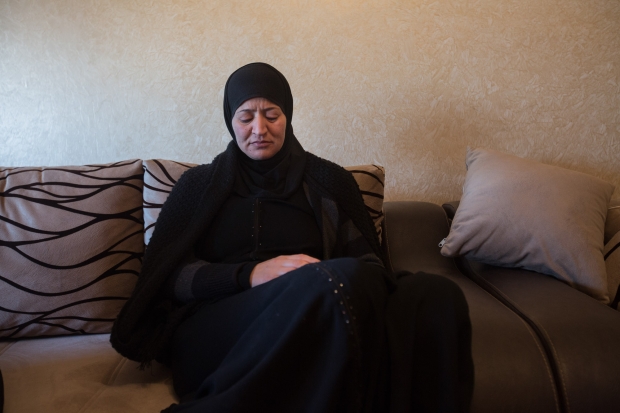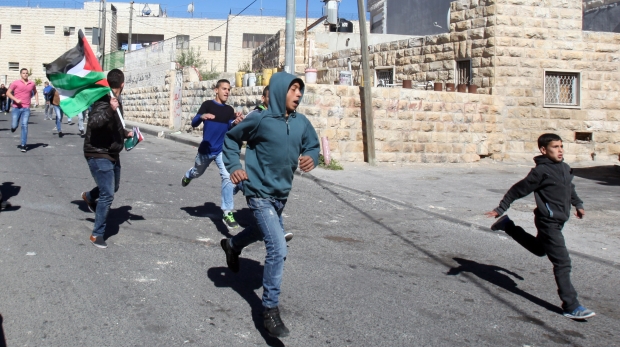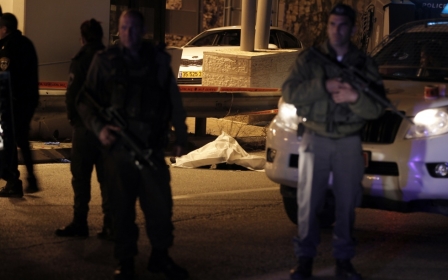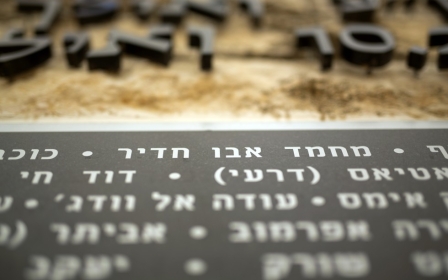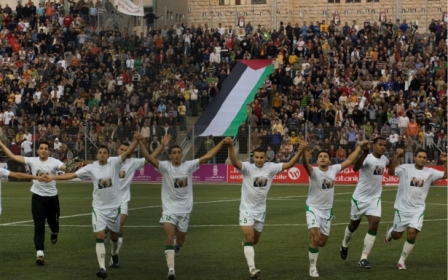Fury in Jerusalem after knife-wielding teen shot dead

It was about midnight, Friday night becoming Saturday morning, when 17-year-old Ali Abu Ghanam began walking towards the Al-Zayyim checkpoint in East Jerusalem.
Two hours earlier, he had left his family home telling his mother he was heading to a party, and that he’d take care not to be back late. He’d put on his best clothes and was with his friends for an hour or so, but he didn't return home as he'd promised. Instead, Israeli soldiers report, he approached the checkpoint “wielding a large knife,” and began running. A confrontation ensued, ending when the checkpoint border police shot the teenager dead.
Abu Ghanam’s mother, Nusreen, was at home waiting for her son when she heard the news. After trying to phone him repeatedly, she received a call from a friend of the family, who said someone had been badly beaten at Al-Zayyim. A few minutes later, she checked a local facebook news page and saw a photograph of Ali on the ground.
“I saw pictures of my son Ali dead on the ground. His shirt was open, and there were bullet holes in his chest,” she told Middle East Eye on Saturday. “I recognised the trousers he was wearing. I went to check the wardrobe in his room to see if the clothes in the picture were there. Then I said “it's Ali”. I could even see the same haircut.”
Abu Ghanem's death was not the only deadly confrontation to have taken place this weekend. Less than 24 hours after he was killed a young man in Hebron stabbed a soldier outside the flashpoint Ibrahimi Mosque, and was also consequently shot dead.
Yousef Natsheh, a member of the Christian Peacemaker Teams international observer presence in Hebron, told Middle East Eye that the dead man had been identified as Mahmoud Abu Juheisheh, in his early 20s from the Idna area of Hebron. His family had been travelling to Saudi Arabia on a pilgrimage at the time of their son's death, he said, and learned of the news through Facebook. They are currently returning to Palestine.
The death of the two men is likely to heighten tensions between Palestinians and Israeli troops in Jerusalem and the West Bank after a period of relative calm over the winter. They are also the latest in a series of attacks by Palestinians against Israeli soldiers and civilians, many of which have resulted in the deaths of assailants.
In early April, an Israeli soldier was stabbed in the neck and a second escaped with lighter injuries; the Palestinian assailant was shot dead. In February, a West Bank teenager stabbed a soldier while being searched crossing into Israel and was “subdued” without lethal force. Earlier, in December last year, a teenager was shot in the leg by an off-duty security guard after he attempted to stab Israelis in the Rami Levy supermarket in Mishor Adumim.
Cases like these, of Palestinians killed during attacks against Israeli soldiers, tend to be praised by Israeli authorities, who argue police respond with appropriate force in the face of unacceptable danger. After two soldiers were stabbed at the beginning of April, outgoing Economy Minister Naftali Bennett said that “serious” incidents “must end” with the death of the assailant and “not with dreams of liberation from jail”.
"Our enemies have only one goal: to hurt as many Jews as they can. I congratulate the security forces who killed the terrorist. This must be the fate of anyone who hurts innocent Jews,” he said.
Speaking to Middle East Eye on Sunday, Israeli police spokesperson Micky Rosenfeld condoned the deaths of both Abu Ghanem and Abu Juheisheh. “We know he [Abu Ghanem} attempted to approach border officers with a weapon, we’re talking about a very sharp weapon, a serious threat to the lives and safety of officers. In this case, luckily they weren’t hurt. In the second case, however, the officer was stabbed in the neck, and obviously here he had no choice but to discharge his weapon,” he said.
“Normally in East Jerusalem when dealing with riots we only use non-lethal force, but if any officer is in a life-threatening situation, he needs to take any measures that he can to protect himself, that’s policy and standard procedure. Police officers have to do everything in their power to protect themselves and the people around them.”
Palestinians and some Israeli organisations, however, have criticised the deaths. In a statement, Jerusalem Post reported, the Palestinian Authority denied Abu Ghanam had attempted to stab soldiers, and argued his killing proved "the cruelty and criminality of the occupation against the defenseless Palestinian people.”
Dalia Kerstein, the Director of human rights NGO Hamoked, said that cases like the weekend’s had happened many times in the past, including most notably the high-profile killing of Arab Israeli Kheir Hamdan. The 22-year-old was shot at close range by a police officer last year after hitting the window of a police vehicle with a knife.
“I think it’s an infringement of human rights. Even if life is endangered, that doesn’t mean the person has to be killed,” she said, adding that the deaths only served to contribute further to a cycle of violence across Israel and Palestine. “It’s often said by different ministers that whoever is trying to commit an act of terror should be killed. I think it’s time someone stood up and said something against the general environment, and to stop the continuation of bloodshed,” she said.
In East Jerusalem yesterday, it was clear that the deaths and what followed them was already inflaming a highly volatile situation. In Abu Ghanem’s family home, female relatives told Middle East Eye that the house was raided in the early hours of Saturday morning, with soldiers firing tear gas and beating male relatives. In the dead teenager’s room, where a cartoon-character sheet was still neatly spread on the bed, furniture had been broken and the hard drive of a PC computer taken.
Family members added that last year Abu Ghanem had been arrested during his final year of school, and had not returned to education after his short imprisonment.
“He was funny, he was taking care of himself and his sisters. He had a lot of friends,” his mother said. “In the future, he said he would stand by his sisters; that when they got married he'd get them a gift that would have everyone in the neighborhood talking. Those were his dreams – but he won't dream any more.”
In A-Tur, an Arab majority neighborhood east of Jerusalem's Old City, banners and posters bearing Abu Ghanem’s face had been hung on houses and stuck to car windows. Clashes continued throughout Saturday, as young men, many with their faces covered by yellow Fatah flags, threw stones and molotov cocktails at police, who responded with sound bombs and tear gas. Injuries were reported among both Palestinians and Israeli forces, one of whom was hit in the face with a stone.
On the narrow street leading to where the clashes were taking place, 36-year-old Jamila watched teenagers run toward the confrontation, some younger children breaking up rocks into smaller pieces. Further uphill, the street was littered with broken paving stones and heaps of rubbish.
“It was like this in the past, the youth coming out into the streets, protesting, the tear gas and throwing stones,” she said. “But now it looks like it’s returning. This will continue all day, and into the night, because of the shaheed [martyr Ali Abu Ghanam].
“You can see the clashes here, which are obviously very dangerous, very violent. But the difficulties are every day and night, with the soldiers coming into our homes, raiding and searching our things, and arresting children and young men,” she added.
In the West Bank city of Hebron, 30km south of Jerusalem, the weekend was calmer: on Sunday afternoon, Natsheh told Middle East Eye that the situation in and around Hebron’s old city remained relatively stable but that a larger number of soldiers than usual were present around the Ibrahimi mosque.“It gets normal for them to have people who get shot by the Israeli army. Now they’re more interested in getting money for their kids, just to survive day to day,” he said. “I think it also makes a difference that the man is not from the old city itself.”
Micky Rosenfeld, however, denied that the weekend’s unrest might hint at a further escalation in tensions and violence in Jerusalem. “These are pinpointed incidents that took place, and which were dealt with as appropriate on a case-by-case basis,” he told Middle East Eye.
New MEE newsletter: Jerusalem Dispatch
Sign up to get the latest insights and analysis on Israel-Palestine, alongside Turkey Unpacked and other MEE newsletters
Middle East Eye delivers independent and unrivalled coverage and analysis of the Middle East, North Africa and beyond. To learn more about republishing this content and the associated fees, please fill out this form. More about MEE can be found here.


